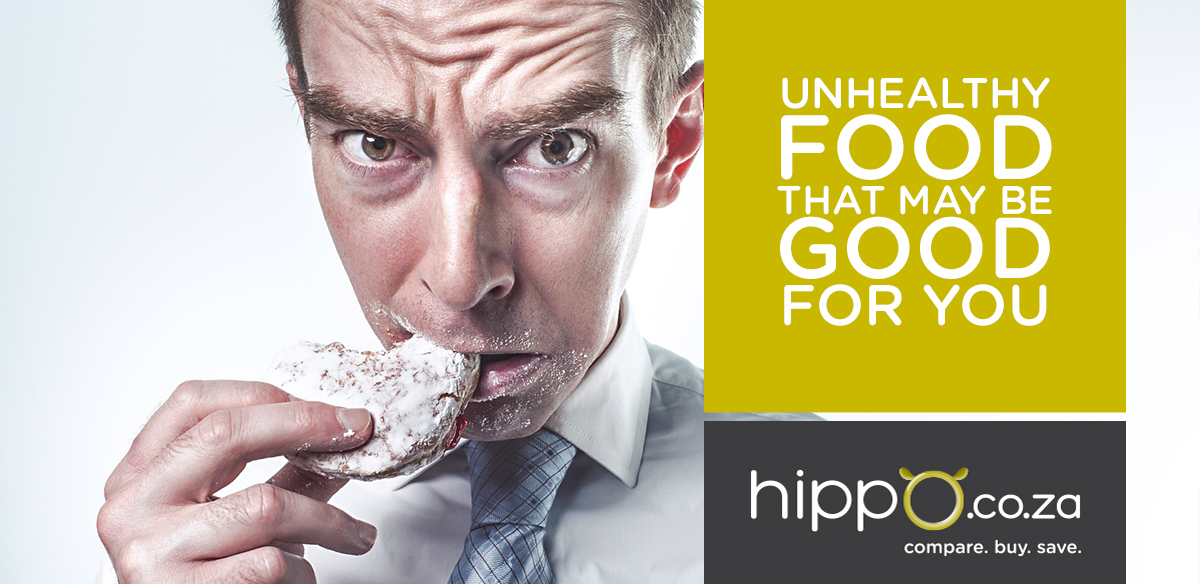Unhealthy Food That May Be Good for You

Eating well is essential for maintaining good health, which, in turn, could help you reduce expenditures on your Medical Aid and treatment costs down the line. Unfortunately in today's fast paced life, it's easier to yield to something crispy that's just been lifted from the deep fryer of a fast-food outlet rather than whip up a wholesome dinner at home. If a recent report by Mail & Guardian is anything to go by, South Africans seemingly have a massive appetite for junk food, with more than 80% of adults queueing every month at local takeaway restaurants.
While conventional wisdom tells us to stay away from meals served in foam containers or paper wraps, not all unhealthy food is bad for one's health. Hippo.co.za reached out to two nutrition experts to find out which foods, snacks and beverages traditionally considered dietary no-no's, may actually have positive health outcomes when taken in very limited portions and cooked the right way.
Jenna Bowes, a clinical dietitian at MME Dietitians, talks three food items you shouldn't be hesitant to add to your daily routine.
Eggs

Egg yolks have been demonised in the food world for contributing huge amounts of fat to your diet as well as causing a significant increase in cholesterol. Although egg yolks do contain fat, they are no more detrimental to weight or cholesterol than the fat found in a lean chicken breast. Fat is needed in the diet but should be consumed in moderation. Eggs are in fact a brilliant, and economic, source of protein and offer a range of vitamins and minerals. Eggs are one of the few foods that give us Vitamin D. One does need to consider, however, how many eggs are eaten at one time as well as how they are prepared.
Potatoes

Potatoes are possibly the most versatile carbohydrate. They're often prepared as potato crisps, wedges, fries, röstis, and mash, as their natural form is often perceived as being less palatable, which isn’t necessarily the case. Some of these potato variations can be high in fats and salt and may contribute to weight gain if frequently eaten in those forms. A potato in its whole form, unpeeled and boiled, with few added condiments like a knob of butter, a dollop of cottage cheese or seasoned with some black pepper or freshly chopped chives, offers us a source of fibre as well as a range of different vitamins and minerals.
Popcorn

Popcorn, like other snacks, is eaten to settle the grumble in between meals. When it comes to snacking, the more convenient and less time consuming the better. Popular snacks are those that we can simply unwrap and eat with little time or effort to prepare. This is why popcorn has been given a bad reputation. The most common form of this snack is ready-popped popcorn or bags of microwave popcorn.
These products can be high in unhealthy fats and often have lots of additives, preservatives with added salt and sugar. Although convenient, microwave or ready-popped popcorn is not always the best option. Homemade popcorn, air-popped or popped on the stove, allows us full control over how much oil and salt are used. Plain, homemade popcorn is, in fact, a snack that is high in fibre and low in fat when made correctly and helps us fill up far quicker than a potato chip. Remember to watch your portions, though.
Megan Bosman, a nutritional therapist at Simply Nutrition, weighs in on two of the most popular pick-me-ups and why it's okay to have that second bite and cup.
Chocolate

Most of the time, chocolate gets a bad name because of its high sugar content. However, dark chocolate contains tryptophan, an essential amino acid used by the body to produce serotonin, better known as the body’s ‘happy chemical’. Chocolate also contains a variety of minerals, including iron and magnesium. Iron is essential for the production of haemoglobin, the pigment in the red blood cells which transports oxygen around the body. Magnesium is important for strong teeth, bones and preventing muscle cramps.
The main ingredient in dark chocolate is cocoa, which is considered a ‘superfood’ (or nutrient-rich food). Cocoa is rich in powerful antioxidants called flavonoids, also commonly found in brightly coloured fruit and vegetables. Flavonoids have powerful anti-inflammatory properties which are beneficial to people suffering from conditions related to inflammation in the body such as arthritis, certain types of cancer and heart disease. The best type of chocolate contains at least 80% cocoa (or more) and contains xylitol or stevia instead of sugar. Look for ones that are dairy-free while you’re at it.
Coffee

For a long time, people have been warned against the risks of caffeinated drinks because of their effect on cholesterol and heart disease. To get a better idea, it's always good to look at the bigger picture. For example, how people are drinking their morning cuppa. Do they add sugar and milk? And, what is the quality of the coffee since many instant coffees contain harmful ingredients that many are not aware of. Drinking coffee in moderation, on the other hand, could actually be beneficial for one's health. The antioxidants in coffee could help prevent cancer, diabetes and even slow down ageing. I recommend choosing a good quality coffee with no added chemicals, and if you like yours sweet and milky then try some healthy alternatives such as almond milk and xylitol.
Conclusion
A balanced diet provides your body with all the nutrients it needs but a little treat every now and then should be okay. If you have a craving, you can add the above foods to a healthy diet but keep in mind that moderation is key.
Hippo.co.za has made this article available as an information resource only, and cannot be held responsible for any harm caused by this article. Readers are encouraged to consult a registered dietitian or nutritionist regarding any further dietary advice.
Hippo Blog Categories

































